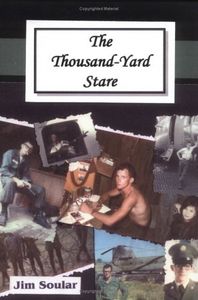WINTER 1998 Montanan - Volume 15, Number 2 susanna sonnenberg
Book Chat
Poet James Soular writes of a diminishing world in his collection of Vietnam poems, The Thousand-Yard Stare. In spite of the poet's urgent efforts, piece by piece and bit by bit, land and people are catastrophically erased, and an extraordinary, almost unbearable loneliness emerges. Soular is the chronicler, appointed by default, the last one left standing and a voice sober and rich with the histories of others now dead.
And Soular does them honor, memorializing his innocence and his fellow soldiers as he writes with unnerving control of this ghastly experience. Writing from an inner territory laid barren by physical and psychic horror, the poet creates a vivid and treacherous landscape.
Soular's lucid images of wartime Vietnam, the "land of awful noise" and "lead-spattered skies," are brutal. In "The Agent," he describes the physical effects of Agent Orange as feeling like "you were the victim of a severe beating." "Tripwire" contains a final image that will haunt the reader as it has the writer:
When Jones tripped
the wire that exploded
the buried 500-pound bomb,
he was blown up
and apart.
Jones ceased to exist
except for one combat boot
pointing down the jungle trail
and a fine, red mist
settling,
settling...
With a film director's obsession for detail and ability to shift points of view, Soular recreates his own witness and imagines the dead buddies, new widows, anguished mothers and tragic sweethearts. In "Missing," a pair of Marines comes to the door to tell a soldier's wife that her husband is missing in action. "Finally, they leave and you hiss at his picture,/'You bastard! How could you have done this/to us? Come back, damn it, or I'll kill you!"'
In "Letter to David, Dead These Twenty Years," the poet says he wished he'd traded places with his friend, then admits, "But I'm no longer sure-/it may simply be bravado/since I'm alive and safe and here." Later in the same poem he describes his own fate:
Somewhere in there
I met my wife, or ex-wife, got her pregnant
and married her-had to do the right thing,
didn't I, same thing we said about going to Nam?
The comparison is chilling, a glimpse of how the Vietnam War taught Soular to see the rest of his life, and how it ruined living. These raw poems are undeniably powerful, an important addition to the war literature canon.
